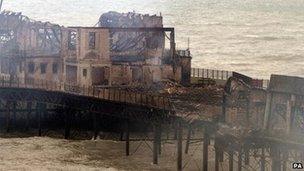Seaside towns regeneration fund to be extended
- Published
- comments

A project to restore Hastings pier was among previous successful bidders for cash
Seaside towns are being invited to bid for money from a £29m funding pot aimed at boosting deprived areas.
The government says its Coastal Communities Fund is being extended to 2014-15, due to rising marine revenue.
It is backed by revenue from offshore wind farms, tidal power and other marine activity.
Previous bids have included a project to make Wadebridge, Cornwall, Britain's first solar-powered town and a new harbour on Barra, in the Western Isles.
Chief Secretary to the Treasury Danny Alexander said the fund was "giving our seaside towns and villages a real chance to grow as the nation benefits from our marine resources".
He said the fund would help create hundreds of opportunities for local apprentices and support jobs and businesses in the areas.
Earlier this month, the Centre for Social Justice think tank warned that some seaside towns in England and Wales were stuck in a cycle of poverty and suffering "severe social breakdown".
Deprivation
And figures from the Office for National Statistics (ONS) this week suggested 25 out of 31 "larger" English seaside towns had above-average levels of deprivation, including Skegness, Blackpool, Clacton and Hastings.
Blackpool, which attracts more visitors per year than any other UK coastal town, had the highest level of deprivation among the larger English seaside destinations in 2010, the ONS figures suggested.
Health and disability were the biggest areas of deprivation in the seaside towns.
Among the six towns which bucked the trend were Poole and Christchurch in Dorset and Bognor Regis in West Sussex.
The Coastal Communities Fund was set up in 2012 to try to boost deprived seaside towns and villages and will now be extended by a year. The government says the idea is to help coastal towns to create new business opportunities, jobs and skills that will benefit the area.
The money behind it comes from the Crown Estates, which own the rights to fish-farms, wind farms, ports and marinas. Successful bidders are given money equivalent to 50% of revenues generated from things like offshore wind and tidal power and ship moorings in the area.
- Published22 August 2013
- Published5 August 2013
- Published15 August 2013